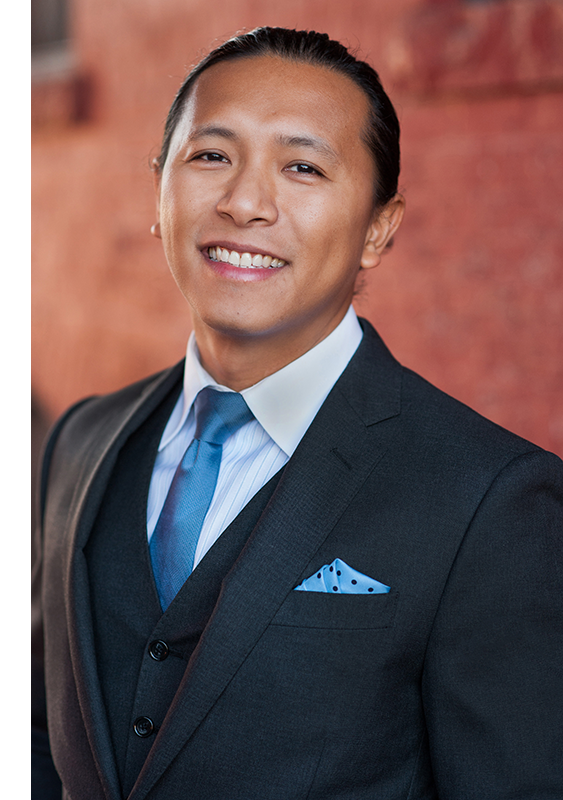The scale and consequences of COVID-19 are unlike what we have experienced before, but this is not our first time dealing with complex situations. We are working to understand what we do and don’t know about the disease, using fundamentals to inform systematic change."
ADRIAN VELASQUEZ MD, MPH'14
 As the medical director of the Newport Hospital ICU in Rhode Island, Adrian Velasquez MD, MPH’14 is part of the team involved in developing contingency plans to prepare for surges of COVID-19 patients. Resources are finite, especially ICU beds, so they are continually working to identify vulnerable populations and decrease their exposure. Velasquez says his Dartmouth Institute education honed his ability to work with a team to arrive at optimal conclusions, including helping his Newport team partake in simulations to safely manage COVID-19 patients.
As the medical director of the Newport Hospital ICU in Rhode Island, Adrian Velasquez MD, MPH’14 is part of the team involved in developing contingency plans to prepare for surges of COVID-19 patients. Resources are finite, especially ICU beds, so they are continually working to identify vulnerable populations and decrease their exposure. Velasquez says his Dartmouth Institute education honed his ability to work with a team to arrive at optimal conclusions, including helping his Newport team partake in simulations to safely manage COVID-19 patients.
Velasquez has also been working per diem at the Carney Hospital ICU in Boston. Carney is a designated COVID-19 hospital for taking care of critically ill COVID-19 patients. “Seeing the lethality of the disease firsthand is an eye-opening experience,” Velasquez says. “While our knowledge base is rapidly expanding, taking care of these patients without peer-reviewed guidelines is a challenge that many of us have not previously experienced.”
When he is not working with ICU patients, Velasquez is focused on using telemedicine to continue addressing his patients’ needs through his sleep medicine practice.
.
The Dartmouth Institute's emphasis on social determinants of health, and the push to identify the furthest behind first has helped me see beyond classic predictors of vulnerability and better target the response."
KIM MWAMELO MPH'17
For Kim Mwamelo MPH’17, the COVID-19 pandemic has challenged the classic view of ‘vulnerable’ populations and ‘healthy populations.’ In Tanzania, the first cases were among middle class individuals, who are not typically considered vulnerable. In her role with the Embassy of Ireland/Irish Aid in Tanzania, Mwamelo is working to ensure Tanzania's COVID-19 response is based on evidence and best practices tailored to the local context, in view of limited resources and constricted civic/political space.
As a Program Manager for Reproductive Health and Nutrition, Mwamelo is managing Ireland’s portfolio on reproductive health and nutrition in Tanzania and countries of secondary accreditation. As part of the COVID-19 response, Ireland has provided grants to multiple UN and NGO partners working in support of the Government of Tanzania’s response to COVID-19. Through support to the WHO and UNICEF, Mwamelo's team is helping to make sure that personal protective equipment (PPE) and treatment supplies such as ventilators are available to providers and facilities.
.
Sharing best practices and learnings are so important, [especially during these uncharted times], and are strategies that The Dartmouth Institute always emphasizes."
LISA (JACKSON) LUCAS MPH'14
Lisa Lucas MPH’14 is inspired to use her Dartmouth Institute research training to document COVID-19’s impact on organ donation to help organ procurement organizations navigate similar crises.
Lucas currently works in the tissue donation field for Iowa Donor Network, where she speaks to families about the opportunity for donation after their loved one has passed. Not only is their donor pool smaller during this time, but many elective surgeries, which typically use donor grafts have been postponed. Still, the need for donation (both organ, tissue, and eye) continues and must be carried out, she explains. “I am honored to play a part in this life-saving and life-healing work,” Lucas says.
TACKLING THE CHALLENGES OF COVID-19
During this unprecedented crisis, Dartmouth Institute students and alumni are impassioned more than ever to improve the health of their communities.

